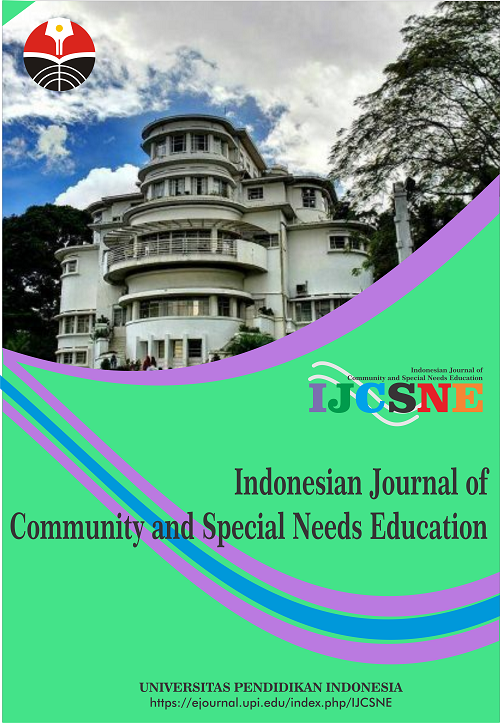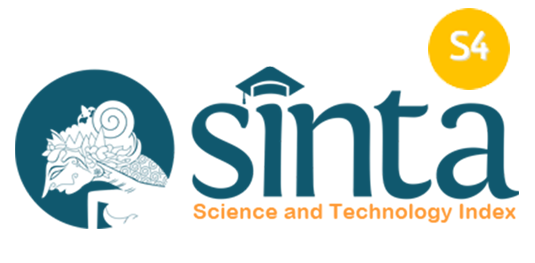Coping with Adolescence: Parents’ Experiences in Providing Sexuality Education to Deaf Adolescents
Abstract
Keywords
Full Text:
PDFReferences
Carpenter, G. L., and Stacks, A. M. (2009). Developmental effects of exposure to intimate partner violence in early childhood: A review of the literature. Children and Youth Services Review, 31(8), 831-839.
Deltenre, P., and Van Maldergem, L. (2013). Hearing loss and deafness in the pediatric population: causes, diagnosis, and rehabilitation. Handbook of Clinical Neurology, 113, 1527-1538.
DiLullo, C., McGee, P., and Kriebel, R. M. (2011). Demystifying the Millennial student: A reassessment in measures of character and engagement in professional education. Anatomical Sciences Education, 4(4), 214-226.
Emong, P., and Eron, L. (2016). Disability inclusion in higher education in Uganda: Status and strategies. African Journal of Disability, 5(1), 1-11.
Fausto-Sterling, A. (2019). Gender/sex, sexual orientation, and identity are in the body: How did they get there?. The Journal of Sex Research, 56(4-5), 529-555.
Giami, A. (2015). Sexuality, health and human rights: The invention of sexual rights. Sexologies, 24(3), e45-e53.
Jivanjee, P., Kruzich, J. M., and Gordon, L. J. (2009). The age of uncertainty: Parent perspectives on the transitions of young people with mental health difficulties to adulthood. Journal of Child and Family Studies, 18, 435-446.
Kar, S. K., Choudhury, A., and Singh, A. P. (2015). Understanding normal development of adolescent sexuality: A bumpy ride. Journal of human reproductive sciences, 8(2), 70-74.
Kismödi, E., Corona, E., Maticka-Tyndale, E., Rubio-Aurioles, E., and Coleman, E. (2017). Sexual rights as human rights: A guide for the WAS declaration of sexual rights. International Journal of Sexual Health, 29(sup1), 1-92.
Lozano-Verduzco, I., and Rosales Mendoza, A. L. (2016). In/formal sex education: learning gay identity in cultural and educational contexts in Mexico. Gender and Education, 28(4), 546-561.
Muhwezi, W. W., Katahoire, A. R., Banura, C., Mugooda, H., Kwesiga, D., Bastien, S., and Klepp, K. I. (2015). Perceptions and experiences of adolescents, parents and school administrators regarding adolescent-parent communication on sexual and reproductive health issues in urban and rural Uganda. Reproductive Health, 12, 1-16.
Panichkriangkrai, W., Topothai, C., Saengruang, N., Thammatach-Aree, J., and Tangcharoensathien, V. (2020). Universal access to sexual and reproductive health services in Thailand: achievements and challenges. Sexual and Reproductive Health Matters, 28(2), 1805842.
Punch, R., and Hyde, M. (2011). Social participation of children and adolescents with cochlear implants: A qualitative analysis of parent, teacher, and child interviews. Journal of Deaf Studies and Deaf Education, 16(4), 474-493.
Rich, S., Levinger, M., Werner, S., and Adelman, C. (2013). Being an adolescent with a cochlear implant in the world of hearing people: Coping in school, in society and with self identity. International Journal of Pediatric Otorhinolaryngology, 77(8), 1337-1344.
Rogers, A. A. (2017). Parent–adolescent sexual communication and adolescents’ sexual behaviors: A conceptual model and systematic review. Adolescent Research Review, 2, 293-313.
Sable, C., Foster, E., Uzark, K., Bjornsen, K., Canobbio, M. M., Connolly, H. M., and Williams, R. G. (2011). Best practices in managing transition to adulthood for adolescents with congenital heart disease: the transition process and medical and psychosocial issues: A scientific statement from the American Heart Association. Circulation, 123(13), 1454-1485.
Saewyc, E. M. (2011). Research on adolescent sexual orientation: Development, health disparities, stigma, and resilience. Journal of Research on Adolescence, 21(1), 256-272.
Smelser, N. J. (2004). Psychological trauma and cultural trauma. Cultural Trauma and Collective Identity, 4, 31-59.
Terlektsi, E., Kreppner, J., Mahon, M., Worsfold, S., and Kennedy, C. R. (2020). Peer relationship experiences of deaf and hard-of-hearing adolescents. The Journal of Deaf Studies and Deaf Education, 25(2), 153-166.
Treacy, A. C., Taylor, S. S., and Abernathy, T. V. (2018). Sexual health education for individuals with disabilities: A call to action. American Journal of Sexuality Education, 13(1), 65-93.
VanderKaay, S., Moll, S. E., Gewurtz, R. E., Jindal, P., Loyola-Sanchez, A., Packham, T. L., and Lim, C. Y. (2018). Qualitative research in rehabilitation science: Opportunities, challenges, and future directions. Disability and Rehabilitation, 40(6), 705-713.
Zhang, J., and Makaiau, A. S. (2021). Cultivating and nurturing a positive school culture and climate: Impacts of Philosophy for Children Hawai ‘i at Waikiki Elementary School. Journal of Philosophy in Schools, 8(1), 129-162.
DOI: https://doi.org/10.17509/ijcsne.v4i2.78460
Refbacks
- There are currently no refbacks.
Copyright (c) 2024 Universitas Pendidikan Indonesia

This work is licensed under a Creative Commons Attribution-ShareAlike 4.0 International License.















